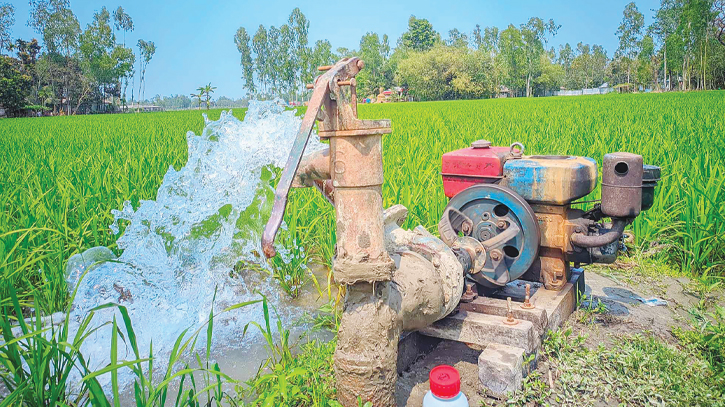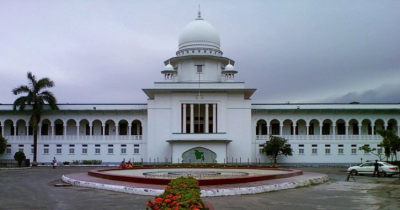
Photo : Messenger
Agriculture is one of the main sources of income for most families of Gaibandha. The agriculture as well as life of these families are therefore highly dependable on nature. Several lakhs of farmers of Gaibandha are doing farming by adapting to these rules of nature.
Due to the impact of climate change, the farmers of this region are farming through various difficulties in recent years. Due to intense heat and drought, there is an increase in the risk of crop burning, and as the groundwater level goes down, the production cost increases due to irrigation through deep tube wells.
Since the beginning of the Boro season, the cost has increased due to the lack of rainfall for irrigation, especially in the months of February-March. So the farmers are worried about crop production and profit after meeting all expenses.
Scorching heat, severe drought and lack of normal rainfall have led to an alarming drop in ground water levels in various parts of the district, adding to the additional costs. In some areas there was not enough water for this year's boro cultivation. Due to severe drought, some areas have to irrigate at one and a half to two times higher cost than normal.
Speaking to the farmers and agriculture officials, they said that due to the drought, 20 to 30 percent additional irrigation has to be given depending on the region. This has increased the production cost of the crops. But due to the effect of drought, even after providing additional irrigation, farmers are not able to maintain the normal production of Boro paddy.
Alamgir Hossain, a farmer of Gaibandha Sadar upazila, cultivated boro on 6 bigha of land this year. Last year the maximum cost of irrigation was Rs 1500 per bigha, but this year the cost was Rs 2000.
Mominul Haque, a farmer of Bagda Bazar in Katabari Union of Gobindaganj Upazila, is facing the same situation. He told that the water level in this area is dropping at an alarming rate every year. Irrigation is being done through deep tube wells few years back as shallow tube wells are not working. But even this amount of water is not available according to the demand. Currently, Chaitra month is going on, even though the agriculture department is talking about retaining water in the land, there will be huge losses due to poor irrigation system.
According to the calculations of the Directorate of Agricultural Marketing, the production cost per kg of rice is 26 taka 1 paisa, and that of rice is 38 taka 96 paisa. Agricultural Extension Department production cost of rice is 26 taka 19 paisa, rice is 38 taka 53 paisa; Bangladesh Rice Research Institute has set the production cost of rice at 25 taka 28 paisa, rice at 37 taka 7 paisa and the production cost of rice at 27 taka and rice at 39 taka by the Ministry of Agriculture.
According to Gaibandha Agricultural Extension Directorate, the target of IRRI-boro cultivation has been set in 1 lakh 28 thousand 365 hectares of land in seven upazilas of the district in the current season. Among them, 21 thousand 305 hectares in Gaibandha Sadar Upazila, 8 thousand 304 in Phulchari, 14 thousand 704 in Saghata, 14 thousand 408 in Sadulyapur, 11 thousand 809 in Palashbari, 31 thousand 105 in Gobindganj and 26 thousand 730 hectares in Sundarganj Upazila have been targeted for boro cultivation.
The jute farmers of Sundarganj Upazila of Gaibandha said that the jute fields in different places of Chauchi were damaged due to intense heat and lack of rain. Jute trees are drying in the hot sun of Baisakh. This has caused fear among the farmers about jute cultivation.
On the other hand, the water level has dropped due to continuous intense heat. Due to frequent irrigation of jute land, the cost of production is increasing, similarly, farmers are not able to clear the weeds from the land due to severe drought. Farmers fear that the target of jute production will not be achieved.
Khorshed Alam, deputy director of Gaibandha Agricultural Extension Department, said that the agriculture sector is the most affected by climate change. This year the temperature in Chaitra month of Gaibandha district may be 40 degrees. From the Agriculture Office, farmers are being advised on how to conserve water on land. Apart from this, regular yard meetings are being held with the farmers on how to reduce the cost of production by adopting scientific methods.
Messenger/Disha








